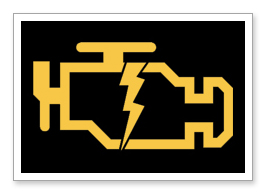Posted on 12/9/2011

Few things are as worrisome as having the CHECK ENGINE light go on while driving. These tips from Consumer Reports can help you determine whether your vehicle has a loose gas cap or serious engine problems. The feared check engine light! Call it the most misunderstood indicator on your dashboard, the "check engine" light can mean many different things, from a loose gas cap to a seriously misfiring engine. Ignore the warning, and you could end up damaging expensive components. It also can be a sign that your car is getting poor fuel economy and emitting higher levels of pollutants. What the Light Means The "check engine" light is part of your car's so-called onboard diagnostics (OBD) system. Since the 1980s, computers increasingly have controlled and monitored vehicle performance, regulating such variables as engine speed (RPM), fuel mi ... read more
Posted on 12/9/2011
What to do if the "check engine" light goes on These tips can help you determine whether your vehicle has a loose gas cap or serious engine problems Last reviewed: February 2011 You're driving along in your car or truck and suddenly a yellow light illuminates on your dash telling you to check or service your engine. If you're like most car owners, you have little idea about what that light is trying to tell you or exactly how you should react. Call it the most misunderstood indicator on your dashboard, the "check engine" light can mean many different things, from a loose gas cap to a seriously misfiring engine. "It doesn't mean you have to pull the car over to the side of the road and call a tow truck. It does mean you should get the car checked out as soon as possible," says Dave Cappert of the National Institute for Automotive Service Excellence, a Virginia-based organization that tests and certifies auto technicians. Ignore the warning, and you could end up damaging expe ... read more
Posted on 11/28/2011
As the holiday season approaches, it is easy to forget about giving your car the tender loving care it needs to stay healthy. But with the start of heavy snow, icy roads and cold weather, now is the time to prepare your car for the winter. Cold weather makes pliable material stiffer and more brittle and can make fluids thicker. If you live an area with severe winter weather, you know how dangerous the roads can get and the unique problems winter weather can create for your car. So before you start making that shopping list, look through our list of top 5 winter car care tips! 1. Take your car in for a tune-upIf you haven't taken your car to the shop for a while, now is the time to do so. A tune-up will help keep your car running longer and may save you money by detecting potential problems early. 2. Check your TiresOn slippery or icy roads, your tires are extremely important to giving you stability and controlled handling. So before the ... read more
Posted on 11/22/2011
The three signs you need to change your car battery 1. Does your car fail to start or is sluggish to turn over in the morning - while this is often a sign that your car battery is failing to hold a charge, there are tests that you can do to make sure that this is an accurate assessment - though, in all fairness, this is often the first sign that people use to decide whether their car battery needs to be changed. If your car fails to start in the morning, and you're sure there's nothing else wrong with it, chances are there's something wrong with the batteries - but before you rush out to replace the battery, give the terminals and connections a good clean, just to be sure.2. Your car refuses to start after running for a while - this is often the cause of a lot of confusion for motorists - your car just won't restart when you get back in after filling up. In most cases, a catastrophic battery failure may have happened - or one of your leads may have come loose. Give the battery a qu ... read more
Posted on 11/17/2011
Readers Digest has great car tips and here is one that can help you. Does your car key share a chain with a dozen or more other keys? That's a pretty heavy load hanging off the car key when it's in the ignition.The weight, combined with bouncing while you drive, can wear out the tumblers inside the ignition and eventually lead to ignition switch failure.To add years of service to your ignition switch, purchase a lightweight key chain that allows you to separate your ignition key from the others. Drive with only the ignition key in your ignition. If your ignition key "sticks" when you try to turn on the car, it's a warning that your ignition switch is about to fail. Replace it before you get stranded
Posted on 10/31/2011
Some more good tips from the National Institute for Automotive Service Excellence:Engine Performance-Get engine driveability problems (hard starts, rough idling, stalling, diminished power, etc.) corrected at a good repair shop. Cold weather makes existing problems worse. Replace dirty filters-air, fuel, PCV, etc. A poorly running engine is less efficient and burns more gasoline. Fuel-Put a bottle of fuel de-icer in your tank once a month to help keep moisture from freezing …in the fuel line. Note, too, that a gas tank that's kept filled helps prevent moisture from forming. Oil-Change your oil and oil filter as specified in your manual-more often if your driving is mostly stop-and-go or consists of frequent short trips. A poll of ASE Master Auto Technicians revealed that re ... read more
Posted on 10/27/2011

Here is some excellent advice from the National institute for Automotive Service Excellence. It's foolhardy to head out in a poorly maintained vehicle in the dead of winter, of course, but even vehicle owners in temperate zones need to consider a fall car-care check, note the pros with the non-profit National Institute for Automotive Service Excellence (ASE), an independent group that tests and certifies the competence of auto technicians. "Regular, routine maintenance can help improve your gasoline mileage, reduce pollution, and catch minor problems before they become big headaches," says Martin Lawson, ASE's editorial director. The following tips ASE will give you a road map to fall car care. First things first-Read your owner's manual and f ... read more
Posted on 10/21/2011
Here are some interesting facts about cars - thanks to Chevron. The car is one of the most recognizeable inventions of the modern era. Without cars there would be no suburbs, car trips, endless drop-offs and pick-ups most parents are all to familiar with. Here are some fun facts about cars and their colorful past. The first cars did not have steering wheels. Drivers steered with a lever. The New York City Police Department used bicycles to pursue speeding motorists in 1898. The first speeding ticket was issued in 1902. In 1916, 55 percent of the cars in the world were Model T Fords, a record that has never been beaten. The first gas gauge appeared in cars in 1922. In 1923, 173 new inventions by women for cars had been reported. Among these inventions were a carburetor and an electric engine starter. The first car radio was invented in 1929. Buick introduced the first el ... read more
Posted on 10/18/2011

Prepare your car for winter. Remember that we can prepare any car in Boise for winter driving conditions! Don't get stuck in the snow! Don't get stuck in the snow! Start with a checkup that includes: Checking the ignition, brakes, wiring, hoses and fan belts. Changing and adjusting the spark plugs. Checking the air, fuel and emission filters, and the PCV valve. Inspecting the distributor. Checking the battery. Checking the tires for air, sidewall wear and tread depth. Checking antifreeze levels and the freeze line. Your car should have a tune-up (check the owner’s manual for the recommended interval) to ensure better gas mileage, quicker starts and faster response on pick-up and passing power. THINGS TO CARRY IN YOUR CAR An emergency situation on the road can arise at any time and you must be prepared. In addition to making sure you have the tune-up, a full tank of gas, and fresh anti-freeze, you should carry the following items in your trunk: Properl ... read more